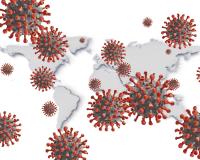
Vibrant Environment
Pollution Control
All | Biodiversity | Climate Change and Sustainability | Environmental Justice | Governance and Rule of Law | Land Use and Natural Resources | Oceans and Coasts | Pollution Control

The coronavirus pandemic is affecting a variety of industries, from travel to retail to restaurants. But perhaps the hardest-hit are meat and poultry processing plants, which have been experiencing outbreaks throughout the United States. In April, President Trump issued an Executive Order declaring these plants “critical infrastructure” to make sure they stay open, and the number of cases in these plants continued to rise in the days and weeks that followed. According to the Midwest Center for Investigative Reporting, as of June 15 there have been over 25,000 reported positive cases tied to meatpacking facilities in at least 235 plants in 33 states, and at least 90 reported worker deaths at 39 plants in 24 states.

The Environmental Law Institute (ELI) is pleased to announce the winners of the 31st Annual National Wetlands Awards: Mark Beardsley; John W. Day Jr.; Trinity Favazza; Ted LaGrange; Sam Lovall; and Robert Wade. Together, these awardees have restored, researched, and protected thousands of acres of wetlands nationwide; their examples have inspired many members of their community to act and make a difference to protect and improve these vital natural resources.

The Environmental Law Institute (ELI) is pleased to announce the winners of the 31st Annual National Wetlands Awards: Mark Beardsley; John W. Day Jr.; Trinity Favazza; Ted LaGrange; Sam Lovall; and Robert Wade. Together, these awardees have restored, researched, and protected thousands of acres of wetlands nationwide; their examples have inspired many members of their community to act and make a difference to protect and improve these vital natural resources.

The COVID-19 pandemic is bringing to light many intersectional divides in the United States that mainstream society can no longer ignore. Lovinia Reynold’s blog last week looked at how environmental racism is linked to higher COVID-19 mortality rates among Black communities.

Black people are bearing the brunt of COVID-19’s impact. Cities such as the District of Columbia, Milwaukee, and St. Louis and states such as Illinois, Louisiana, Michigan, and Mississippi have released data demonstrating that Black people make up a disproportionate number of COVID-19-related deaths. These deaths are due in no small part to centuries of structural inequality that limit access to what public health experts call the social determinants of health.

With the 50th Anniversary of Earth Day still on our minds, air quality is thriving throughout the United States’ most populous areas. It is a goal long fought for by leaders in environmental law and policy, but it has only been achieved with the cost of the devastating COVID-19 pandemic.

Nearly four billion people worldwide are under government mandates to socially distance themselves from one another in order to “flatten the curve” of COVID-19. Non-essential workers are hunkering down at home, bringing the daily commute and air travel to a virtual halt. The resulting decline in air pollution is stunning, visible even in satellite images.

Drinking water contamination in Flint, Michigan, has garnered nationwide attention, but it is neither isolated, nor a primarily urban problem. As Madeline Kane explains in the April issue of ELR—The Environmental Law Reporter, a hidden water crisis is straining thousands of smaller communities that share Flint’s risk factors—shrinking populations, social marginalization, and deficient funds.

Citizen science—the gathering of environmental data by non-professionals—has taken root across the United States and internationally. However, much of this activity has focused on public awareness and education; the connection to government agencies is less publicized.
At the request of EPA, ELI is investigating how state, tribal, and local environmental agencies are using citizen science in their work. We have found a tremendous diversity of approaches, from programs organized and led by government to cases in which agencies are the end-users of information gathered by others such as community groups. We have also found some areas in which contributions by members of the public could be of great value to state or local environmental programs.

“Not everything that can be counted counts, and not everything that counts can be counted.”—William Bruce Cameron
“Better three hours too soon than a minute too late.”—William Shakespeare